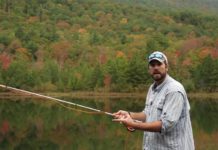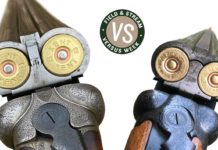As they left their home on Long Island in February, Michael and LaToya Legemah knew they wanted to embrace their new life in northeastern Pennsylvania. This included learning how to fish.
They just weren’t sure how to go about finding out all the nitty gritty ins and outs of the sport.
Since they both work in the computer industry, they did what came natural, and tuned into YouTube videos and online searches.
“You can only learn so much from YouTube though,” she said. “I wanted to see how to do it myself.”
They found the listing for the Pennsylvania Fish and Boat Commission’s educational series called “Introduction to Fishing Activities” in an online search.
“We went online to meetup.com and searched fishing groups,” she said. “And we found this one. I catch sunnys all the time, I want to learn to catch bass.”
The PFBC offers multiple classes throughout the year, including this series at Frances Slocum State Park as well as others at Ricketts Glen.
This class, which is taught at Slocum on Wednesdays throughout August by Regional Educational Specialist for NEPA Allan Schreffler, offered a brief introduction to fishing and fishing skills. Pre-registration was required and no fishing license was needed for the duration of the program.
The official website says, “Participants will be taught the basics of how to be safe, cast, bait a hook and go fishing. PFBC staff provide all fishing equipment, bait and instruction. Again, no fishing license is needed, the equipment, bait and instruction are provided for free. Participants are encouraged to bring their own equipment. This is a great opportunity to bring your newly purchased fishing rod and learn how to use it.”
And the Legemahs did just that.
Armed with multiple rods and an ambitious collection of what seemed to be every tackle offered from Walmart and Dick’s Sporting Goods shelves in many different sizes, shapes, and textures, the couple was ready to learn how to use their own equipment for their enjoyment.
Schreffler started out the class with basic identification of local fish, going through the Pa. Fish Identification Guide, and using wood cutouts painted to look like the fish. He then continued on educating them about basic knot tying.
The course was open to anyone who registered, and that day the Legemahs had the teacher to themselves. Fortunately, they had enough questions to keep the two-hour class moving.
The specialist explained the seasons and creel limits, as well as stocking.
“The waterways are stocked because they can’t produce wild trout,” explained Schreffler. “It is a ‘put and take’ situation….. we put them in, you take them out. We stock so that the sportsmen have more opportunities to catch the fish.”
The former New Yorkers were astounded at Schreffler’s description of how fish, such as trout, are stocked in Pennsylvania’s waters, and vowed to be a part of the process next April, COVID-19 restrictions permitting.
From there, a brief discussion of different types of tackle ensued, reviewing why certain hooks, bait and lures were used in different situations. He explained why it was imperative to use the proper equipment to catch certain species of fish.
“Different colors and movements attract different fish,” he said.
LaToya was full of insightful questions, and Schreffler answered each query with expertise and knowledge.
He made personal recommendations, such as using corn flavored Powerbait for trout fishing.
“I have been out on many opening days, and the best results I have seen are with that. It is even better than the real thing,” he added.
The educator continued, discussing vegetation in the Legemah’s community lake, and how to take advantage of its diverse species.
“You want to have a rod you can have some fun with,” Schreffler told them as he explained what the differences between sizes on different hooks and line weight means. “It is fun to fight for a fish.”
LaToya said she thought bobbers were for beginners, and something you graduate from, but Schreffler explained the tackle’s usefulness of setting the bait into water columns.
“I’m just learning so much here today,” she proclaimed.
As the teacher and students continued to discuss different techniques, Schreffler said, “Fishing season is never really over, it all depends on what time of year and season it is. There is always something to fish for. The only time we shut waters down is when we stock.”
Once the rods were rigged, Schreffler let Michael and LaToya take some dry land casts in an open field, to get the hang of maneuvering the stick.
“I get it tangled sometimes, but now I learned to bring the rod to the side and around, like an oval, instead of just straight back,” said LaToya.
Adventure, as well as healthy competitiveness, took the couple to the water’s edge, where they showed off what they had learned in the lake.
“A lot of things get lost in translation in YouTube videos,” said Michael. “To actually be out there, and see these things with our own equipment, was so helpful. I highly recommend this to everyone.”
LaToya agreed, “(Allan) answered all of our questions, it was amazing. I feel we are so much ahead of the game now.”
Other courses Schreffler and the PFBC offer are: I’m a SMART Angler, Family Fishing Program, Family Ice Fishing Program, Introduction to Fly-Fishing, Ladies Introduction to Fly Fishing, Introduction to Kayak Fishing, and Kids Fishing Derbies/Rodeos.
The PFBC recommends that if you are experiencing any symptoms of illness, stay home, stay safe and take care of yourself. Also, all participants and instructors must wear a face mask during the duration of the program, only use their PFBC assigned rod and reel or their own equipment, and all participants and instructors must practice safe social distancing, (6 feet apart), at all times.
Visit the PFBC’s calendar of events to register for upcoming courses, and more information can be found on their website.
Credit: Source link































